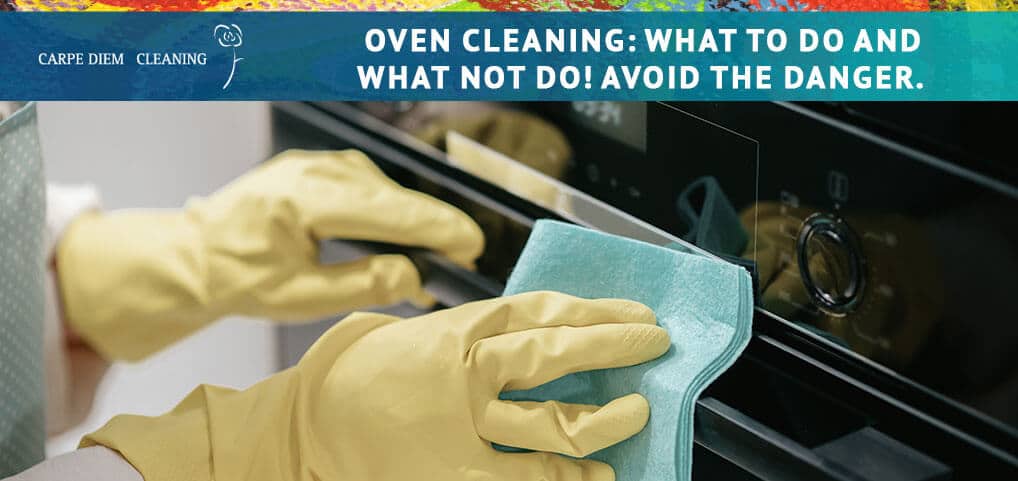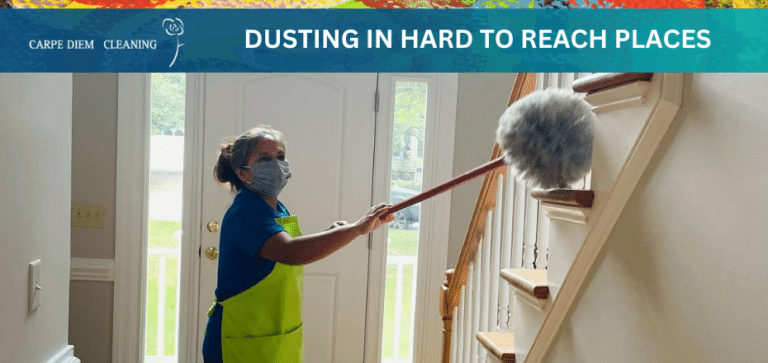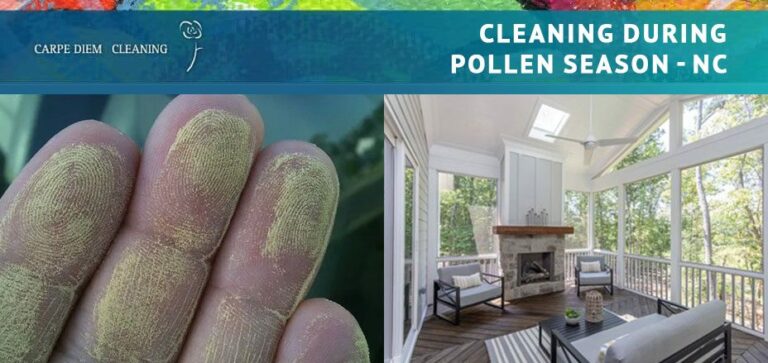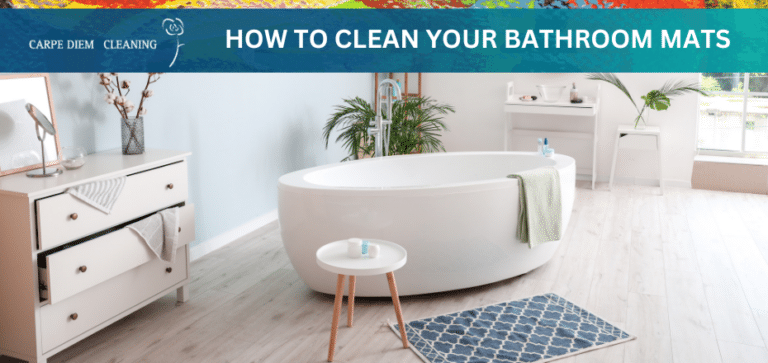"The oven is undoubtedly one of our kitchens' most used and essential appliances."
Over time, grime, grease, and food debris can build up, affecting its performance and posing health risks. Regular oven cleaning is vital to maintain its efficiency and ensure your family’s safety and the appliance’s longevity.
You might be tempted to grab that oven cleaner and start scrubbing; hold on!
Let’s discuss some important considerations before you begin taking matters into your own hands.
1. The Importance of Regular Oven Cleaning:
Oven cleaning is more than just about having a sparkling kitchen. A clean oven is crucial for several reasons:
a) Better Cooking Results: A clean oven distributes heat evenly, resulting in better-cooked meals with consistent taste and texture.
b) Energy Efficiency: A dirty oven requires more energy to reach and maintain the desired temperature, leading to higher utility bills.
c) Reduced Fire Hazard: Grease and food debris inside the oven can be a potential fire hazard if not cleaned regularly.
d) Prolonged Appliance Lifespan: Proper maintenance and regular cleaning can extend the life of your oven, saving you money on costly repairs or replacements.
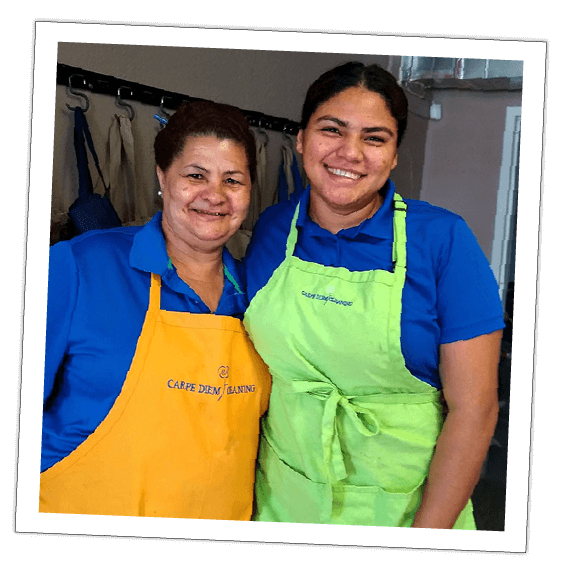
2. Different Oven Cleaning Methods:
There are various methods to clean an oven, ranging from chemical cleaners to natural solutions. Here are some popular approaches:

a) Commercial Oven Cleaners: These are widely available and contain strong chemicals to dissolve tough stains and grease. While they can be effective, they come with risks and should be handled cautiously.
b) Natural Oven Cleaners: Some people prefer natural alternatives, such as baking soda, vinegar, lemon, or a mixture of these ingredients. While generally safer, they might require more effort and time to remove stubborn stains.
c) Professional Cleaning Services: If you are uncomfortable with DIY cleaning, consider hiring professional house cleaning services. Carpe Diem Cleaning in Durham, NC, offers oven cleaning as part of their add-on services for any scheduled cleaning service. They use specialized equipment and cleaning agents to deep clean the oven efficiently and safely.
3. The Dangers of Using Oven Cleaner on Countertops:
While oven cleaners are designed to cut through tough oven grime, they can be extremely harsh and hazardous if misused. Using oven cleaner on countertops is strongly discouraged due to the following reasons:
a) Toxic Fumes: Oven cleaners contain chemicals like lye and ammonia that release toxic fumes when sprayed. Inhaling these fumes can cause respiratory issues and other health problems.
b) Surface Damage: Oven cleaners are formulated to dissolve grease and stains on oven surfaces, which makes them too strong for most countertops. The chemicals can etch or discolor the countertop surface, leading to irreparable damage.
c) Contamination of Food Preparation Areas: Using oven cleaners on countertops can lead to chemical residue lingering on the surface. This residue can contaminate food and pose health risks if ingested.
d) Personal Safety: Direct contact with oven cleaners can cause skin irritation, chemical burns, and eye damage. Always wear protective gloves and goggles if you use such products for oven cleaning.
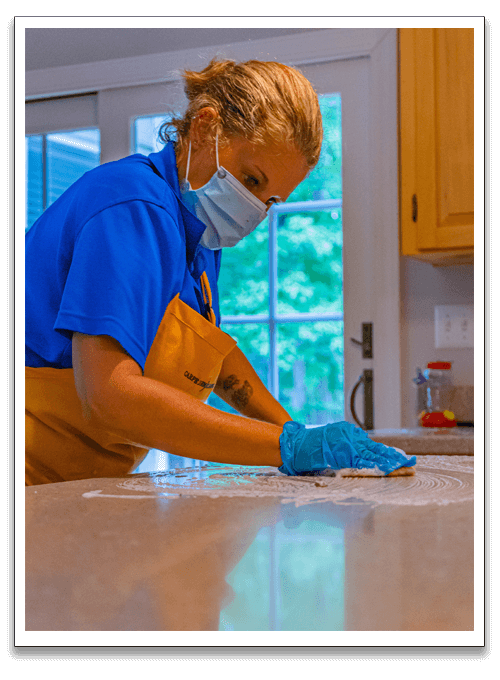
4. Safe Alternatives for Countertop Cleaning:
Use mild, non-toxic cleaning agents such as dish soap, baking soda, or vinegar solutions to clean your countertops safely. These are effective against most countertop stains without posing health risks or damaging the surface.
Regular oven cleaning is essential for maintaining a safe and efficient kitchen. However, it’s crucial to use appropriate cleaning methods and avoid oven cleaner on countertops due to the potential risks it poses to your health and kitchen surfaces.
Opt for safer alternatives, and if you’re uncertain or uncomfortable with the process, don’t hesitate to seek professional house cleaning services. You cannot go wrong with a local house cleaning business with decades of experience. At Carpe Diem Cleaning, we are committed to using eco-friendly procedures and practices. Find out more here.
Oven Cleaning by Carpe Diem Cleaning
Reach out and schedule an oven cleaning as an add-on service to any of our cleaning service options. We are a trusted house cleaning company and have been part of the local business landscape for almost 30 years. Our hard-working teams of women are trained, bonded, and insured. We arrive with smiles and appreciate the honor of being in your home.
Commonly Asked Questions
Is oven cleaner safe?
Oven cleaner typically contains strong chemicals designed to dissolve stubborn grease and food residue in ovens. While effective for cleaning, these chemicals can be hazardous if not used properly.
It’s essential to follow safety precautions and manufacturer instructions when using oven cleaner, including wearing gloves, ensuring adequate ventilation, and avoiding direct contact with skin or eyes.
Additionally, always store oven cleaner out of reach of children and pets and never mix it with other cleaning products to prevent dangerous chemical reactions.
I used oven cleaner without gloves. What should I do?
If you’ve used oven cleaner without gloves, it’s important to take immediate action to minimize potential harm. Rinse your hands thoroughly with water and mild soap to remove any residue from the cleaner.
If you experience any irritation or discomfort, seek medical attention promptly. Consider reaching out to your physician with any concerns.
Is it dangerous to inhale oven cleaner?
If you accidentally inhale oven cleaner fumes, move to an area with fresh air immediately and seek medical attention if symptoms persist or worsen. Inhaling oven cleaner fumes can be harmful to your health, as these fumes may contain toxic chemicals such as lye or ammonia.
Symptoms of inhalation exposure may include difficulty breathing, coughing, throat irritation, and nausea. To prevent inhalation exposure, always use oven cleaner in a well-ventilated area, such as with open windows or doors, and wear a mask or respirator if necessary.
What does oven cleaner do to countertops?
Oven cleaner is designed to break down and dissolve tough grease and grime on oven surfaces, but it can damage certain types of countertops if not used correctly. Harsh chemicals in oven cleaner may cause discoloration, etching, or deterioration of countertops made of materials like marble, granite, or laminate.
To protect countertops, avoid spraying oven cleaner directly onto them and instead use a barrier, such as plastic wrap or aluminum foil, to shield surfaces adjacent to the oven. Always read the manufacturer’s instructions and test a small, inconspicuous area before using oven cleaner on countertops to ensure compatibility and prevent damage.
Can a dirty oven cause a fire?
Yes, a dirty oven can pose a fire hazard if grease and food residue accumulate and come into contact with heating elements or flames during cooking.
Grease buildup can ignite at high temperatures, leading to a kitchen fire. To minimize the risk of fire, it’s essential to regularly clean your oven, including removing grease and food debris from the interior surfaces, racks, and door seals.
Use a suitable oven cleaner and follow recommended cleaning intervals to maintain a safe cooking environment and reduce the likelihood of a fire.
Is it safe to cook in an oven after cleaning it?
After cleaning your oven with oven cleaner, it’s generally safe to cook in it once the cleaner has been thoroughly rinsed and any residual chemicals have been removed. However, it’s essential to follow the manufacturer’s instructions for the specific oven cleaner product used, as some cleaners may require additional steps or rinsing to ensure food safety.
Additionally, always preheat the oven with the door open to allow any remaining fumes to dissipate fully before cooking.
If you have any concerns about residual cleaner or odors, you can run a short self-cleaning cycle or wipe down the oven interior with a mild detergent and water before use.

